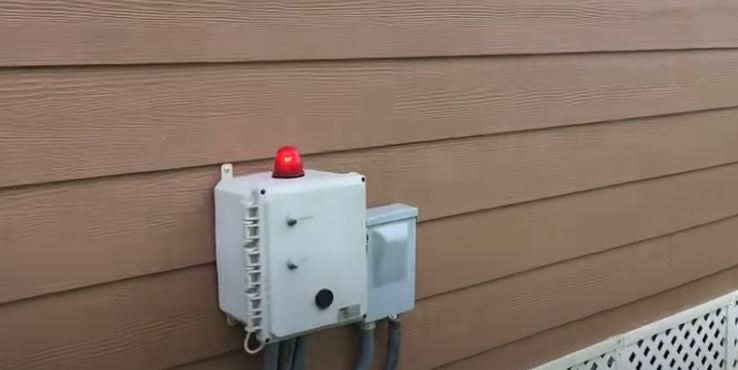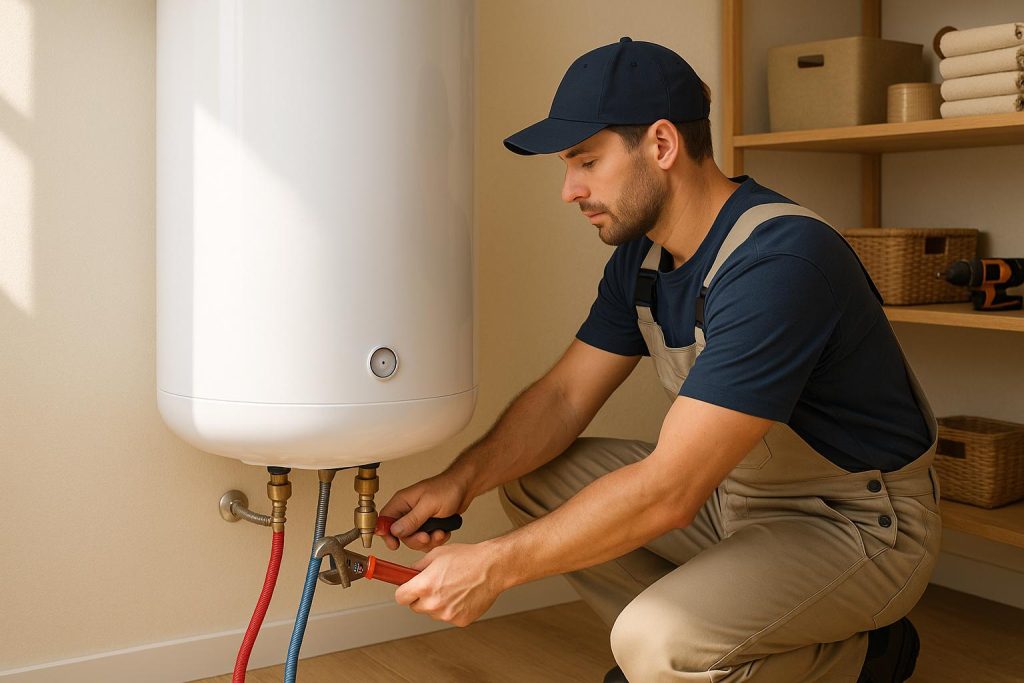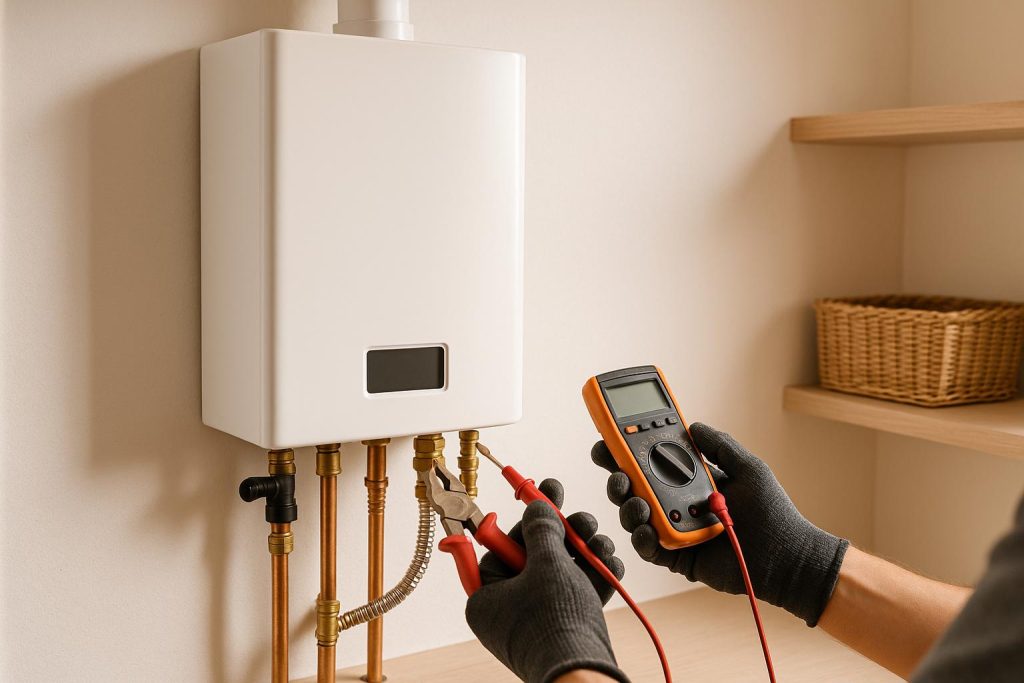
A septic alarm going off is a warning signal that something is amiss with your septic system. Here’s a brief summary of why your septic alarm might be activated and what to do:
Causes of a Septic Alarm Going Off
- High Liquid Level: The most common reason for a septic alarm is that the liquid level in the septic tank has risen to an unusually high level. This can occur due to overuse of water, a leak in the system, or a failing drainfield.
- Pump Failure: If your septic system has a pump to move effluent to the drainfield, a pump failure can cause the alarm to activate. This can be due to a malfunctioning pump, power outage, or clogged discharge lines.
- Electrical Issues: Electrical problems in the control panel or float switches can lead to false alarms or prevent the system from functioning correctly.
What to Do When the Septic Alarm Goes Off
- Don’t Ignore It: An activated septic alarm should never be ignored. It’s a sign of a potential septic system problem that needs immediate attention.
- Check for Visible Issues: Inspect the septic tank area for any visible signs of trouble, such as standing water, wet spots, or unusual odors. These can provide clues about the nature of the problem.
- Contact a Professional: If you’re unsure about the cause of the alarm or if you see signs of septic system issues, contact a licensed septic system professional. They can inspect and diagnose the problem accurately.
- Avoid Flushing or Using Water: Minimize water usage and avoid flushing toilets, doing laundry, or using the dishwasher until the issue is resolved. This helps prevent further strain on the system.
- Keep People and Pets Away: Ensure that the area around the septic tank and drainfield is secure and keep people and pets away to prevent accidents and damage to the system.
How a Septic Tank Alarm and Pump Work

As you already know, septic tanks are installed underground but the clean water after the organic waste has been broken down needs to be drained out in the drain/leach field. And that is where a septic tank pump and alarm comes in.
Since there is a lot of waste inside the septic tank, the pump cannot be installed there. A secondary tank called a pump tank is where the water drains into before it is picked up and pumped out by the pump.
The pump in your septic system does not work like a well pump. In a well pump, the pump is not timed and the cycling is determined by demand.
With a septic system, the pump is controlled by a timer. This means that the pump will only come on after a certain duration of time (or during certain times within a day)
Why is this though? Why not have the pump remove the water as soon as it is high enough in the tank?
The reason for this is simply to protect the drain field. You want to give the drain filed ample time to drain the water which has already been sent its way.
This prevents the drain filed from being overloaded. It also prevents the pump from running all the time which causes overheating and premature failure.
So, why have the alarm in the first place? What difference does it make having it in place?
Well, the alarm monitors the water level/elevation inside the pump tank and lets you know when the level is too high or too low. While in most of the times a high water level will be the problem, a low water level is also a bad thing.
If there is a lot of water getting into the pump tank in between pumping cycles, the excess water will have nowhere else to go than accumulate inside the tank. When the level of water inside the tank goes past the recommended point and the pump has not kicked in yet, the alarm will go off to warn you of the same.
If you were doing tasks such as laundry, dishwashing or anything else that sends excess water in the septic tank, the alarm tells you it is time to pause until the system goes back to normal.
As I said, most people think that whenever the septic tank alarm goes off the water level in the tank is high. The opposite could also be true.
If the water level in the pump tank falls below the required point, the alarm will go off as well. But what could cause this problem?
A low water level septic alarm is a warning that the pump is not shutting off properly, the septic tank is leaking among other problems.
If for instance the pump is not shutting off, the alarm will warn you to have the pump fixed (usually a problem with the float) to prevent premature failure. A constantly running pump will burn the motor due to overheating necessitating a replacement.
Why is my Septic Tank Alarm Going Off?

The following are some of the causes of a septic tank alarm going off:
- There is too much water being introduced into the septic tank. If you have chosen a specific day to do all of your laundry for the month, a lot of water will be introduced in the septic tank raising the water level in the pump tank and triggering the alarm.
- The same will also happen if you are running the dishwasher for a long time, taking long showers or if you have leaking fixtures in your house. Check also that you don’t have a faucet left turned on.
- Heavy rainfall. Storm runoff is not connected to the septic tank but if the ground is saturated with water, some of that water can seep into the septic tank and cause the water levels to rise. Pooling or standing water on top of the septic tank will also result in the same.
- Pump failure. A pump can fail in 2 ways. In the first way, it may fail to pump water out of the tank resulting in a high water level which will trigger the alarm to go off. A septic tank pump can also get stuck in the on position resulting in water level in the tank falling below the required level. Again, the alarm will go off as well.
- Leaking septic tank. If a septic tank or the sewer line to the septic tank is leaking, the water level will fall below the required mark prompting the alarm to go off.
- Power outage. If there is a power outage, it means that the septic pump will not be powered resulting in an increase in the water level inside the tank. This will trigger the alarm to go off until it is switched off or the power is restored.
What to Do
So, what should you do when your septic alarm goes off? Luckily a septic alarm is not an emergency hence it gives you time to troubleshoot the problem yourself or call a professional if you can’t fix it.
The first thing you should do is turn off the alarm. Locate a red button or switch on the alarm box and push/flip it to turn off the alarm.
The next thing is to find out why the alarm went off in the first place.
To do that, look for a red light and green light located somewhere on the alarm box. If the red light is on, it is a sign that the water level in the pump tank is higher or lower than required.
On the other hand, the green light indicates that the alarm is properly powered. That light should always be on unless there is a problem.
Proceed to your main house electrical panel and inspect the septic system breaker to ensure that the system is being powered.
If you have a water well, you will probably have 2 breakers labeled ‘Pump’. Make sure you are checking the septic pump and not well pump.
It is highly likely that someone flipped the septic tank breaker to the off position and forgot to turn it back on. If that is the case, you will only need to turn it back on.
A bad septic pump can also trip the breaker. If you flip the breaker to the on position but it quickly trips back to the off position, you most likely have a problem with your septic pump.
In that case you will need to contact a septic tank expert to come over and have a look. I wouldn’t recommend a DIY for this job or any other job involving a septic system.
You can also walk around you yard and check if there is standing water on top of your septic tank. That could explain why the alarm is going off.
Drain the water and letting the pump run for a few cycles will be enough to fix the problem. If you occasionally experience standing water in your home, installing a French drain system can be a solution to this problem.
And basically that is why your septic tank alarm is going off and what to do about it. I hope this guide was helpful.
Related: Signs you need to empty your septic system.





